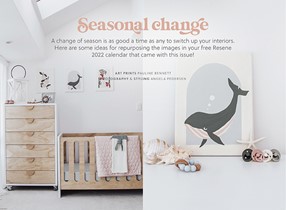A raw and real account of surviving colic

First-time mama Lara Featherstone shares a raw and real account of her motherhood journey so far, in the hope that others who find themselves in a similar position won’t feel so alone. This is her story...
I was told I was in for a ‘rude awakening’ and man were they right. Being a mum is a magical experience but it's a journey with many ups and downs along the way. I was so excited to become a mother and couldn’t wait to meet the newest member of our team, however, I wasn’t quite prepared for the realities of the journey I was about to embark on and I really don’t believe any new mother could be.
The never ending sleepless nights, the many tears, the stress, the doubting yourself, and the lengths you have to go to for your baby. So many mothers experience these things, but adding to this already huge load a colicky baby who is inconsolable no matter what you do, every day and every night.

My world was turned upside down when Isobel turned two weeks old. Little did I know that colic was going to consume my life for the next few months, with no finish line in sight.
As a first-time mum, I didn’t know any different and thought this was normal. The thing I couldn’t understand was why everyone loved this newborn stage so much. I was always being told to enjoy this magical time – the cuddles, the smiles and the pure joy that a newborn brings – that they grow up so fast.
Well, I got none of those things. Instead what I got was the purple crying, the clawing at my face for hours on end (and wow babies have sharp little claws), and my baby choking due to crying so much. Oh and very minimal sleep.
I hit rock bottom when Isobel was about nine weeks old. I was so exhausted, mentally and physically. I had tried everything possible and nothing was working. I went to the doctor, colic specialist, naturopath, osteopath, tried all types of remedies, swaddles, dummies – you name it, I had tried it. I would read books out loud for hours on end to send my mind elsewhere while she screamed. I would spend the nights awake squatting or lunging or walking up and down the stairway as movement was the only way to soothe her.
I remembered I used to wonder why you’d be told to “never shake a baby” – who shakes a baby?! But it made a lot more sense at around 3am when my angry gnat had been screaming in my ear for three hours straight as I walked a marathon around the house.
White noise, now the soundtrack of my life, was on 24/7 and we were living like vampires in darkness, always trying not to wake our baby up. Thankfully we both managed to keep our sense of humour as I needed that to get me through.
As the days went on I found each one longer than the last and thought "Oh gosh, how will I even make it through tomorrow?". Every day had a new challenge and a new opinion or input from someone. The one comment that annoyed me the most was “It gets better, just hang in there.”
Walking the same route each day became my new routine and even the dog was sick of it. The walk was close to home so if her screaming got too bad I could get home fast, my heart thumping with every step.
I was stressed and anxious but for my sanity I needed to get out of the prison that I used to call my home. Often on a walk with bubba screaming her head off, people actually had the audacity to tell me my baby was crying. "Yes, I can hear her thanks, people two blocks away can!"
Going to the supermarket with a screaming baby brought me to tears so I quickly learnt that online shopping was the best way to go, to avoid being stressed. It got to the point that I found myself hiding from the world, not wanting any visitors and being anxious to step foot outside of the house. No matter what I did, no matter what I tried, it never helped and I came to the realisation that it was me that had to survive this. I had to get through this, for both myself and Isobel.
A friend of ours told us, “You get the baby that you can handle” and that was probably the most comforting comment we received. I’m a strong and caring mum and I’m doing a great job!
At the time of writing this we are now at week 13 and colic is still going strong. So the question is, are the minimal smiles, coos and ga-ga's all worth it? Well at the moment we’re ‘one and done’, but I hear having a baby is like a hangover and on Monday and Tuesday you’re never drinking again but on Wednesday all of a sudden you feel like a drink. So, to the question, is it all worth it? Ask me on Wednesday.
Q&A WITH PAEDIATRICIAN CARMEN BASU
Hi Carmen, tell us a little bit about yourself and your line of work?
I’m a Consultant Paediatrician at Milk & Honey Paediatrics, and I also work in hospitals based in Auckland as a General Paediatrician, including Starship. I’m a breastfeeding māmā to a 9-month-old baby boy and I also have a lively, loud and fun 4-year-old son. I am fortunate to have a kind and beautiful 13-year-old stepdaughter too.
I am passionate about improving the first 1000 days of a child’s life. I would love to see more focus in valuing and nurturing our little ones to give them strong foundations for the future.

What exactly is colic?
Colic is a term that is used to describe babies who cry more than average. The vast majority of these babies are healthy and have no abnormalities on medical assessment. Most babies with colic spontaneously get better around 4 months of age. I think I speak for a lot of medics when I say we should change the name for this diagnosis. Colic seems to imply a puku or gut problem. There is actually currently no evidence in science to suggest this is the case. Also lots of over-the-counter treatments seem to target the tummy specifically, further misleading and confusing parents.
How common is colic?
10% of babies cry for well over 3 hours daily. Up to 5 hours of crying can be considered normal for babies.
Is colic regularly mistaken for reflux, gas or generally fussiness? What is the main difference?
There is no question that your baby can look like they are experiencing terrible tummy pain. Often these babies draw their knees to their chest, their stomach feels hard, they can spill milk into their mouth and pass wind. But it’s actually an urban myth that the cause is abdominal mamae or pain. Our current theory is that it is overstimulation or understimulation of your baby’s sensory nervous system. Wiring your brain for the first time is hard work and downloading all this new data about your environment is exhausting. Some babies experience this developmental time very sensitively while others may breeze through it.
The gut and brain are strongly linked too. For example, when people are anxious, overwhelmed or exhausted they often lose their appetite – that doesn’t mean they have a gut problem, it just means that it is impacting the gut, among other things. Likewise, a baby who fusses and seems to have an upset stomach may be indicating more about their emotional state than their physical state. That’s not to say a baby can’t be experiencing colic (trouble balancing their nervous system) and tummy issues at the same time. Baby’s gut is extremely immature in the first few weeks of life and can be reactive depending on a number of factors. Gut issues will certainly exasperate the issues with a colicky baby, so it’s very easy to see why the two are commonly linked. It’s important to know that most term babies reflux milk into their mouth, pass loud burps and wind and become unsettled in patterns through the day. This is normal behaviour that medication will rarely fix. Also, contrary to popular belief, burping a baby is not the answer for relieving colic.
How long does colic usually last?
Colic can start as early as 2-3 weeks of age with the peak periods of crying usually occurring around the 6-8 week mark. By the 12 week point there is usually a steady improvement.
Is there any medication for colic? Any other recommendations?
Whilst there are products on the market for colic, many are only considered 50% effective when we look at studies, however they will certainly do no harm. Their primary aim is to encourage burping, which can ease tummy troubles, but as we now know, that's not the root cause.

The most effective way to deal with crying is to be prepared. If you are still pregnant, I highly recommend that you and your partner read about normal baby crying before baby comes. A good website for this is purplecrying.info. Have a discussion about what your plan will be if your baby cries for 3 or more hours straight. This might include starting with a simple checklist: check nappy, feed baby, check temperature etc. For further, more detailed information about how to deal with an unsettled baby, I also recommend accessing possumsonline.com.
Use your Lead Maternity Carer, GP or trusted medical professional if you are worried about why your baby is crying. We are ALWAYS happy to review a crying baby.
CARMEN'S TIPS FOR SURVIVING COLIC
🤍 Make sure you have some relatives or trusted friends available if you need a break from your crying baby. You are not a failure or a bad parent if you have cuddled your baby and cannot console them. Hand them over to someone you have confidence in whilst you take a breather. This is vitally important.
🤍 Have some soothing tricks up your sleeve. I particularly like the ones that are bonding activities like baby massage, bathing baby or taking them for a walk outside in a baby carrier.
🤍 Try playing white noise or trying a vibrating device in the bassinet or a baby swing.
🤍 Remember different tricks may work on different days, it’s worth experimenting.
🤍 It’s also worth finding a supportive group of mamas with babies of a similar age so you can exchange tips and tricks for calming a crying baby. There are plenty of support groups online.
Carmen is a British and NZ trained Consultant Paediatrician who specialises in a wide range of paediatric conditions with over 20 years experience. Carmen has an interest in breastfeeding medicine and is training to be a lactation consultant, mentored by her practice partner, the lovely Dr Abby Baskett. She performs tongue tie assessments and she has an interest in unsettled babies, preferring a holistic approach. Find out more at milkhoneypaeds.com

AS FEATURED IN ISSUE 56 OF OHbaby! MAGAZINE. CHECK OUT OTHER ARTICLES IN THIS ISSUE BELOW

















